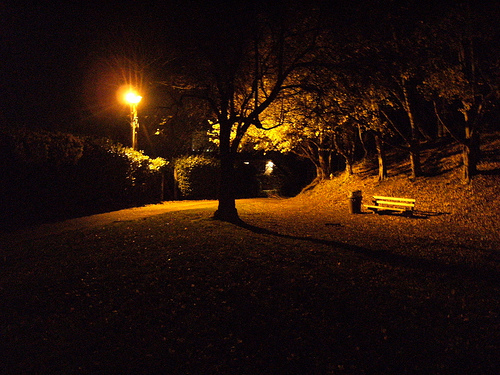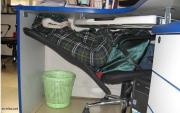Two days ago I submitted my story to a single mother’s group online because they had advertised that they were looking for real stories from single mothers. I of course submitted the following:
“I am still a mother
I’m not that kind of person you often hear about. I’m neither an addict nor a mental health patient. I don’t smoke and I don’t drink. I don’t sleep around and I’m not lazy. I’m not a high school drop out and have never been a pregnant teen. I’m not a quitter, a liar or a thief.
I am a homeless mother.
In April of 2004, when I no longer had a job and used up my savings and monies from my 401K plan, I bought a used 1981 Minnie Winnebago with my tax refund and moved my nine year old and one and half year old into it. Here in Seattle, there’s no such thing as Section 8 for help with housing as our state has been closed to applications for years now. I called shelter after shelter only to be turned away because more people than ever are using them and there aren’t enough built to handle the scores of people entering homelessness. I met with our local welfare office, the last place I wanted to visit, and was told by the social worker that they couldn’t do anything to stop us from being omeless but if I wanted to sell our only shelter and transportation, I could qualify for $400.00 a month in cash. I was then given a food stamp card and sent on my way. I prayed child support for my eldest would show up but to
this day it hasn’t.
For the first several months in our new “home”, I quickly learned just how “as is” the Minnie Winnie was as I read the owner’s manual to figure out what worked and what didn’t. I learned by surprise that the master cylinder on the
brakes needed to be replaced when I went down a hill and couldn’t stop. I learned how to replace an alternator on my own. I paid to have the brakes, generator, voltage regulator, and tires replaced. My plan was to make the Winnebago as safe and livable as possible while trying to get another job and hopefully save enough money to get our lives back. Maybe it would only be a temporary situation lasting a year or two I thought.
In the meantime I worked various jobs through temp agencies, never telling my employers about my living arrangements and definitely never telling them that I was working two jobs every time I got the chance. One day though, my body caught up with me. I happened to be working at a financial services company during the day and had just clocked out. As I headed to the elevators, my peripheral vision started getting watery and a supervisor walking by caught me by the arm and asked if I was alright. I didn’t even realize I was sliding down the wall but I shook it off and told her I would be fine. I didn’t say I say I had to be since I couldn’t afford to be late to the next job.
I made it out to the far end of the parking lot since that was where I always put the RV. I was on my way to my babysitter’s house but halfway there, I felt the left side of my face, then arm go numb. I almost panicked because I was thinking I might be having a stroke or heart attack. I told myself to stay calm and find a place to pull over in case I cause an accident. I remembered a garage nearby that my babysitter’s husband had told me about since the owner was a friend of his. By the time I reached the garage, I was vomiting and couldn’t move my left arm. I could barely stand up and my speech was slurred but I managed to get the mechanic to call my babysitter. Her husband rushed over and took me to the nearest hospital. At first I wasn’t going to go since I had no insurance and knew the hospital wasn’t going to be cheap but my babysitter’s husband made me go anyway. The hospital kept me for observation for about six hours before letting me go. I don’t remember anything else after that except that a few days later I woke up in my babysitter’s room with her holding a cup of water to my mouth. My head was pounding and all I wanted to do was vomit. My face felt numb and for some reason my motor skills were really shaky. My head kept shaking and I could barely talk. All I could think about was the RV getting towed so I tried to sit up but my babysitter pushed me back down and said her husband had talked to the owner of the garage so it was ok to be there until I got back on my feet.
The next day I made myself get up and walk around because I didn’t want to get my babysitter’s family in trouble with their apartment landlord’s who didn’t like me driving the Winnebago through the complex when I came to pick my kids up. Even though my babysitter and her husband wanted me to stay for awhile, I went back to the RV because I didn’t want to be an inconvenience to them. Needless to say I couldn’t work when I could barely walk or keep my head from shaking side to side. The hospital referred me to a local neurologist to find out why I got paralysis with a major migraine. It took me about 10 days or so to recover from whatever this was and I did that by sleeping in the RV at parks during the time my eldest was in school and my youngest was with the babysitter. Eventually I lost the temp job I had and once again found myself looking for work.
In the meantime, the RV needed gas to keep us moving since police harassment is an everyday concern when you live out of your vehicle. I went to local plasma centers to sell my blood for gas money. About 8 months went by before I landed a part-time position at a local newspaper. I couldn’t afford daycare so working the graveyard shift was perfect. The newspaper plant was located in a rural area and had a well lit parking lot. I parked the RV where I could see it from the warehouse windows since my kids slept in the upper bunk while I worked. My shift ended early enough that I had time to get them breakfast and ready for school. Because my eldest was embarrassed to be in a motor home, I would drop her off around the block from her school so that she could walk in without any of her friends seeing her get out of a Winnebago every morning.
I spent the days scanning want ads for a full-time day job as it soon became apparent with the gas hikes that I would again need two jobs to survive. I took my toddler to the parks and hung out with her in public libraries when the weather wasn’t so great. When it was time for dinner, I asked my eldest how her day went and reassured her that everything would be alright and this is only a temporary situation for us. All the consoling I did couldn’t keep her from feeling angry and depressed. She asked why our relatives weren’t helping and how could the government let us live like this? Why wasn’t anybody helping us?
We met some interesting folks living out here and I was surprised to meet other families doing exactly what we were doing. At a Wal-Mart parking lot, we met a family that had come down from Alaska looking for work. They too were living out of motor home but smaller than ours. I was impressed since my Minnie was only 21 feet long, bumper to bumper. When my eldest daughter saw that she wasn’t the only kid living this way, she felt a little better but struggled with the fact that we had no permanency. We also met another single mother living out of class “A” motor home the size of a bus and she told me how she raised both her boys out of it. She was close to retirement and her youngest son at the time was about 19 years old. They worked every day the way I did and saved what they could but the last time I saw them, she was still living out of her motor home. It was through this community of folks living out of motor homes and their cars that I learned where I could park for the night and where the rest stops were that had dumping stations for free. Some camp grounds only charged $5.00 to dump the sewage tanks on RV’s plus I could refill my water tank. The “community” also looked out for us by telling me what places were dangerous to be in and which neighborhoods had a lot of police harassment going on. It didn’t take long to learn how to be “invisible”.
In October of 2006, I landed a full-time day job with another national financial services company and was able to find daycare through a co-worker I befriended at the newspaper job. To this day we call her “Cousin Pam” because she went out of her way to treat us like family. She helped me to get my kids enrolled in the school district next to her house since my kids would be there all day. She told me about sales at local thrift stores to help us with school clothes and she enrolled my kids in programs that helped with school supplies and summer time free lunch programs. If it hadn’t been for “Cousin Pam”, I have no idea how I would’ve worked the day job we so desperately needed. It was a good thing I had that day job because a few months after I got it, the newspaper went out of business. My day job paid twice as much but I still could not save any money. All I could do was maintain living out of the Winnebago since it needed regular maintenance and the gas alone was eating whatever I could’ve saved.
I had been at my day job for over a year when an old complaint returned with a vengeance. This time, the migraine attacks were becoming more frequent and the shakiness had returned. I had bouts of numbness on the left side of my body and didn’t understand why these symptoms were coming back. I took advantage of my employer paid health insurance and went to specialists to figure out what was wrong with me. At first they thought I had the beginnings of
Meniere ’s disease but extensive testing ruled that out. It wasn’t until a year ago that my doctor figured out I had hemiplegic migraines. I had one big attack that left me in serious trouble. I had to go to physical therapy to be able to
walk a straight line without falling due to vertigo that just would not go away. It took eighteen months to recover and needless to say, I exhausted FMLA and lost my job. I even tried to reapply to the same company only to never hear
from them again.
I could’ve given up and ended my life. I could’ve sunk into despair and hopelessness. I could’ve turned to prostitution, drugs, alcohol or violence. But I didn’t and continue to refuse going down that path because that’s not the kind of example I want my kids to see. When everything seemed hopeless I did the only thing I knew how to do; write. I sat behind the steering wheel of the Winnebago and poured all my feelings and thoughts onto paper. To keep my oldest daughter from sinking into depression, I wrote a book to keep her mind occupied on something other than being homeless.
It was through writing to an editor from Change.org that I got connected with a man named Mark Horvath. Thanks to him I’ve had the opportunity to share my story with more people than I ever thought possible. I felt honored when he asked me to manage We Are Visible which is an online community that helps the homeless connect through social media on the internet. I am still connecting with other people, have been on radio programs, have seen my writings on more sites than I can count and I am always amazed at how one story can impact so many other people. I am still homeless. I am still fighting for a better life and doing what I can to help other single mother’s out there keep their hopes alive.
I am not that stereotypical “bum” on a sidewalk corner asking for spare change. I am not that drunk lying on filth in an open alleyway. I am not a “welfare queen”. I am not asking to be pitied or handed a lifestyle. I am not less of a human being because of homelessness.
I am still a mother.”
The interesting thing about this site is that so far, they’ve posted many stories but conveniently have skipped over mine. In all honestly, it’s exactly what I expected. I don’t take it personally because this isn’t the first time my story has been “overlooked”. There were times I joined in online conversations designed for single mothers but whenever I commented about my situation, it was if the room suddenly went quiet.
I am after all…a little too real.


My Comment - We are both decent but struggling people and I hope happier days on Carey and her kids.


 Many years ago, when I was working in television syndication, my department was hiring. A friend from another department recommended his friend who had two years sober. I interviewed my co-workers friend, Jack, but I had no intention of hiring him. Jack WAS a drug addict, and even with two years sober he could still use drugs.
Many years ago, when I was working in television syndication, my department was hiring. A friend from another department recommended his friend who had two years sober. I interviewed my co-workers friend, Jack, but I had no intention of hiring him. Jack WAS a drug addict, and even with two years sober he could still use drugs.






















![[s7.jpg]](https://blogger.googleusercontent.com/img/b/R29vZ2xl/AVvXsEgFy0oh-9JqoQzUzTcb4tu4wnXX2aqZjRLLT0bQ2wU-lKG6MkzlzT_TzYUGmiEqtB34zy4cX_uYA1-cT_gG-vMoO7w8QlSI1nr9SsLjmQ7bde9aMeRnQaIZ7Lu9dTBR-dmqeQefo8i15Fg/s1600/s7.jpg)

